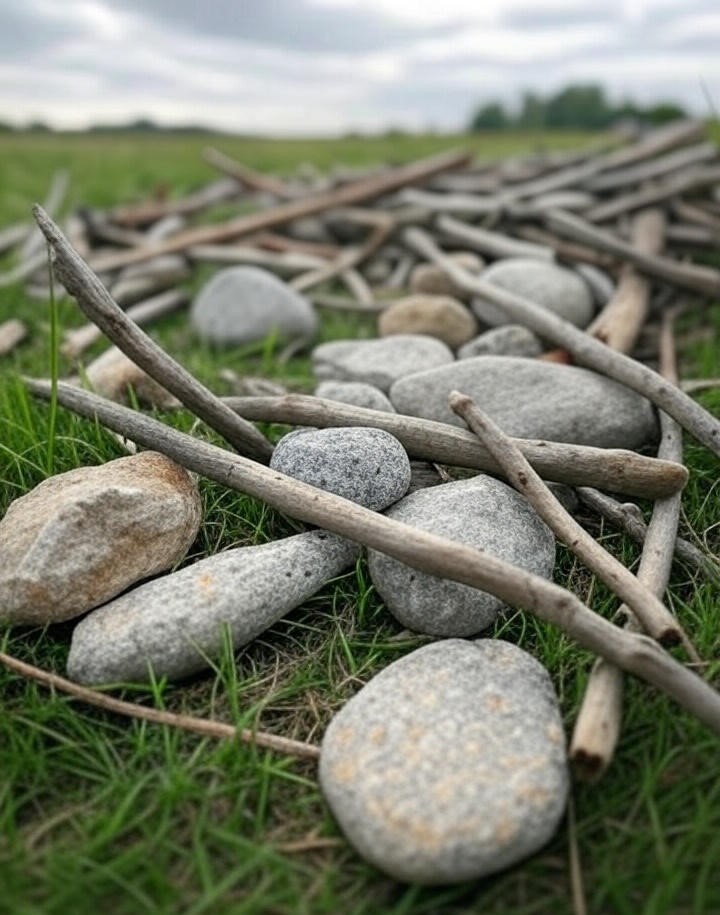
My wife the other day had this really interesting thought: do kids, and in particular boys, gather sticks and stones because of our life style form the ancient past? If you have kids, you probably noticed that they love to look for stones and gift them to you. It's cute and we might dismiss that gesture too quickly and think of it simply as another burden to carry. But could there be more to it? Why stones, and why does this behavior go on for years? Mine started as soon as he could walk essentially. And then there are the sticks which are generally not gifted, but seen as a toy that they want to hold on with their dear life. Anyone that has tried to separate those things from a child knows that it can easily morph into a life or death situation for them. It's either them or screaming and crying for the next half an hour. So why is that?
The idea that this behavior could stem from a behavior that has played a role in our collective survival for millennia is interesting. Sticks and stones are exactly the kind of resources that would have been extremely helpful in our survival. Sure, nowadays we don't think of them as much. But they provided the basis for tools (especially flint stones) for:
Stones
- Cutting tools – flakes of sharp stone for butchering animals or cutting plants
- Scrapers – cleaning hides for clothing or shelter
- Hand axes – multipurpose chopping tools
- Hammers – cracking nuts, bones, or shells
- Projectile points – arrowheads or spear tips
- Grinding stones – processing seeds, grains, or pigments
- Fire starters – striking flint with iron pyrite to spark flames
- Weights – for fishing nets, digging sticks, or traps
- Building materials – foundations for shelters or hearths
Sticks
- Spears – sharpened or fire-hardened for hunting and defense
- Digging sticks – for pulling up roots, tubers, or edible plants
- Fire starters – friction tools (bow drill, hand drill)
- Carrying poles – to transport food, water, or small game
- Shelter building – frames for huts or lean-tos
- Fishing tools – spears, prongs, or even primitive rods
- Weapons – clubs or projectiles when thrown
- Cooking aids – skewers for roasting food over fire
In other words, they were the most basic and essential tools we had! Teaching children to collect them would have been extremely useful for our ancestors. Just imagine kids walking along with the adults and collecting them on the way. Yes please! That would have definitely been encouraged.
Nature and life is still quite mysterious to us and I think we should keep an open mind how certain processes might work. While the materialist and evolutionist might argue that there is simply no mechanism for these things to get passed onto the next generation, I think that stance is quite outdated. Jung talked about the collective consciousness and we even have science to back up such claims (although they argue more from a genetic point of view):
The big idea: can you inherit memories from your ancestors?
The science of epigenetics suggests we can pass on trauma – but trust and compassion too
https://www.theguardian.com/books/article/2024/jun/17/the-big-idea-can-you-inherit-memories-from-your-ancestors?utm_source=chatgpt.com
Conclusion
I love insights like this, since they open our minds up to new possibilities, questions and more avenues for research. It will probably be impossible to "prove" this link definitively, but it seems quite plausible nevertheless. And yes, maybe we should start to make use of these resources the little hands give us again. It's probably the right kind of nudge that we need in a digitized world so we can connect with nature again.

⛅🌦🌧🌦🌧🌨☁🌩🌦⛅🌧☁🌤🌥🌪🌧🌨🌩⛅🌦☁🌤🌥🌤⛅🌤⛅🌦⛅

Check out the Love The Clouds Community if you share the love for clouds!
⛅🌦🌧🌦🌧🌨☁🌩🌦⛅🌧☁🌤🌥🌪🌧🌨🌩⛅🌦☁🌤🌥🌤⛅🌤⛅🌦⛅
